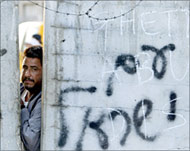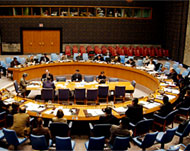British MPs slam apartheid wall
More than 100 British members of parliament have signalled their opposition to the apartheid wall being built on occupied Palestinian land.

The number of MPs from various parties who have signed a so-called Early Day Motion calling on Israel to stop building the barrier rose to 104 on Tuesday – an unusually high level of support.
Most early day motions rarely attract 100 signatures and those that do are almost always on domestic issues.
The motion – organised by the Council for the Advancement of Arab-British Understanding (CAABU) – accepts Israel’s right to security. But the motion notes the wall does not follow an internationally-recognised border and “violates articles 53 and 147 of the Fourth Geneva Convention”.
“It isn’t just about security,” said Matthew Jackson, a spokesperson for CAABU. “It looks as if it fits in with (Israeli Premier Ariel) Sharon’s vision of a Palestinian Bantustan, which allows Israel to annex the settlements and pre-empt final status negotiations.
Construction criticised
Costing about $1 million a kilometre, the barrier – ostensibly to keep Palestinian fighters from entering Israel – was started in June 2002 and the first 140km-long section was completed by August.
 |
|
Opponents of the wall say it turns |
But critics of the wall point out the wall snakes through occupied Arab land to include the illegal Jewish settlements on the Israeli side while cutting off or virtually encircling Palestinian towns. As a result, the wall has been roundly criticised across the world.
Jackson said the number of MPs who had signed the motion was about three times the number of parliamentarians who would normally back such a criticism of Israeli policy. The wall’s route, he said, had “provoked a lot of anger among British MPs”.
“There’s not much to debate,” Jackson told Aljazeera.net, “if they’d built it along the green line (the internationally-recognised border), people could have accepted it but there’s a lot more to this than security – it’s an open and shut case.”
UK role
The issue of the apartheid wall came before the United Nation’s Security Council in mid-October when a resolution, introduced by Arab states, declared the wall was illegal and construction had to stop.
 |
|
UK abstained in Security Council |
Although the draft was backed by most of the council, the US vetoed it, saying it was unbalanced because it did not condemn attacks on Israel. Britain, which has officially opposed the wall as an obstacle to peace, abstained – a move which disappointed the wall’s critics.
“The government has been very strong (in criticising the wall) but abstaining on the UN Security Council resolution was a mistake,” said Jackson. “By abstaining, they made it easier for the US to veto it. They only time they were asked to do something concrete, they failed.”
Although the motion is, as most EDMs, unlikely to be debated by MPs, Jackson said it would put their criticism of the barrier on record with the aim of stiffening government opposition to it.
“They’re saying things but they’re not acting,” said Jackson, “I’d like to think they’ll listen to us.”